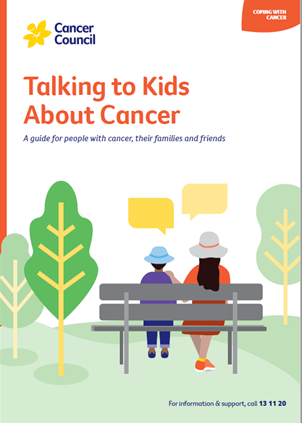- Home
- Cancer Information
- Family and friends
- Talking to kids about cancer
- Living with advanced cancer
- How children react
How children react
When children find out that the cancer is advanced, they may have similar but more intense reactions than when they found out about the original diagnosis. Some studies of people with advanced cancer show that family members often feel more distressed than the person with cancer. This seems to be more common in families who have not spoken with their children about cancer.
Dealing with denial
Some children and teenagers find it difficult to accept that their parent is dying. This is a normal and understandable response to such a painful and difficult situation.
Try to be gentle and supportive of young people who have this reaction. Pushing someone to accept that their parent is dying may be stressful to both the young person and their parents or carers. It’s also unlikely to lead to acceptance.
While an impending death of a parent from cancer may mean that there isn’t much time, try to stay calm and be available to listen to your children’s fears and concerns.
When parents are separated or divorced
All families are different and sometimes family members may not be on good terms. This can affect the way they talk to each other and negotiate challenges, such as cancer.
In most cases, children of separated or divorced parents need to be given the chance to spend time with the parent with cancer. If the parent is likely to die, it’s important that children are prepared for the loss, and that they have the opportunity to say goodbye. It’s also important that a clear plan for the ongoing care of the children is agreed before the parent’s death. If you need help in negotiating difficult family relationships at this time, it may help to talk to a hospital social worker.
48 hours
We were sitting in my sister’s lounge room again when Mum told me Dad was dying. I was like, “Are you serious? This can’t be true.”
From when Dad was first diagnosed with lung cancer to when he died was only 4 months. It was just so quick. The prognosis kept getting worse – first they said it was 12–18 months, then 3–4 months, then 48 hours.
I wasn’t there when he died. I went to a netball dinner. I didn’t want to be around it – that’s not how I wanted to remember him, it’s not what he was like. Dad told me, “Do what makes you feel comfortable. Do the things you need to do to cope.”
When your parent dies, it’s like a snow globe has fallen off a bench and cracked and snow is going everywhere. But the cracks get mended, maybe with sticky tape, and the snow slowly calms down.
IZZY, 15-YEAR-OLD WHOSE FATHER HAD CANCER
→ READ MORE: What words should I use?
Podcast: Explaining Cancer to Kids
Listen to more episodes from our podcast for people affected by cancer
More resources
Prof Jane Turner AM, International Psycho-Oncology Society President Emeritus,The University of Queensland, QLD; Taylor Baker, Consumer; Dr Ben Britton, Principal Clinical and Health Psychologist, Head of Psychology, Hunter New England Mental Health, NSW; Camp Quality; Dr Lisa Cuddeford, Head of Department, WA Paediatric Palliative Care Service, Perth Children’s Hospital, WA; A/Prof Peter Downie, Head, Paediatric Haematology–Oncology and Director, Children’s Cancer Centre, Monash Children’s Hospital, VIC; Dr Sarah Ellis, Clinical Psychologist, Kids Cancer Centre, Sydney Children’s Hospital, NSW; Malia Emberson-Lafoa’i, Consumer; Kate Fernandez, 13 11 20 Consultant, Cancer Council SA; Jane Gillard, Consumer; Mary McGowan OAM, International Childhood Cancer Advocate, VIC; Annette Polizois, Senior Social Worker, Women, Family and Emergency Care Team, Royal North Shore Hospital, NSW; Rhondda Rytmeister, Clinical Psychologist, HeadWayHealth (formerly Snr Clinical Psychologist, The Cancer Centre for Children, Westmead, NSW); Nadine Street, Head of Social Work and Social Welfare, HNE Mental Health Service, NSW; Warren Summers, Online Counsellor, Canteen, NSW.
We would also like to thank the health professionals, consumers, organisations and editorial teams who have worked on previous editions of this title, and we are grateful to the parents and young people whose real-life stories have added to the richness and relevance of this book.
We thank and acknowledge Dr Paula K. Rauch, MD, Founder and Director, Marjorie E. Korff PACT (Parenting At a Challenging Time) Program and Associate Professor of Psychiatry, Harvard Medical School, whose research and writing on helping parents talk to their children about cancer was used as source material for this book and has been adapted in several sections: pages 8–11, How children understand cancer; page 22, Answering key questions: Are you going to die?; page 26, Involving the school or preschool; pages 30–31, Hospital visits; and pages 36–37, Encouraging family time. We also thank the American Cancer Society for permission to use and adapt material on pages 8-11 from its book Cancer in Our Family: Helping children cope with a parent’s illness (2013); Macmillan Cancer Support for permission to use its book Talking to Children and Teenagers When an Adult Has Cancer (2013) as a source of information; Jessica Watt, Oncology Social Worker, The Children’s Hospital at Westmead, for her contribution on page 20, When another child has cancer; and Diane McGeachy, Hobart Counselling Centre, for contributing material for page 37, Spending one-on-one time.
View the Cancer Council NSW editorial policy.
View all publications or call 13 11 20 for free printed copies.
Need to talk?
Support services
Coping with cancer?
Speak to a health professional or to someone who has been there, or find a support group or forum
Caring for someone with cancer
Practical advice and support for carers
Cancer information
Advanced cancer
Information for different stages of advanced cancer
What is grief?
A natural response to loss can involve a range of feelings and experiences

